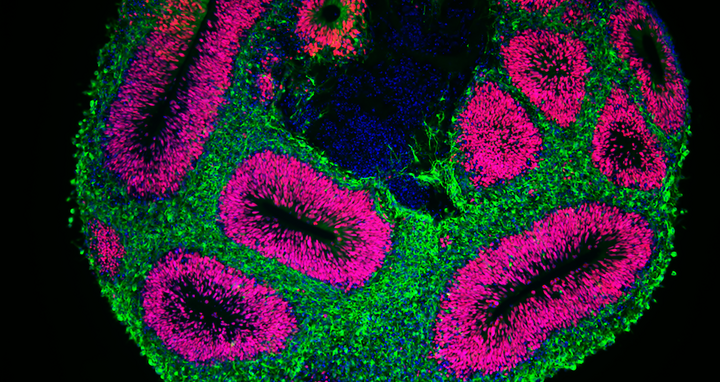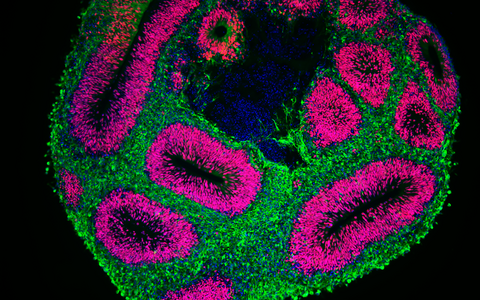Preparations for new Einstein Center begin
When there are just a few diseased cells in our bodies, we neither suffer symptoms nor consequential damage. If we were able to make a diagnosis at this stage and halt the emerging disease early on, patients could be spared a great deal of suffering. To identify these cells reliably and determine their location is, however, no trivial matter. The biomedical and data science community in Berlin is working on the necessary technologies – among them, the Max Delbrück Center.
How does a disease begin? When scientists analyze the individual cells of organoids, for example, they can better understand the course of the disease. Here you can see a 30-day-old brain organoid: The neurons are marked in green, the precursors in red and the cell nuclei in blue.
In order to accelerate translation of this type of precision medicine into clinical practice and to pioneer this approach, researchers and practitioners at ten leading Berlin institutions are joining forces in the Einstein Center for Early Disease Interception. Together, they aim to develop, interlink and apply key technologies such as single-cell analyses (multi-omics and 3D), complex pre-clinical disease models like organoids derived from the cells of patients, and novel approaches using artificial intelligence much faster.
The Einstein Foundation Berlin is providing funding of 600,000 euros to support the consortium which comprises, amongst others, Charité – Universitätsmedizin Berlin, the Berlin Institute of Health at Charité (BIH), the Max Delbrück Center, Technische Universität Berlin (TU Berlin), Freie Universität Berlin and Humboldt-Universität zu Berlin as well as the Museum für Naturkunde and the Max Planck Institute for Molecular Genetics. The Einstein Foundation announced this decision on August 3, 2023. During the two-year pilot phase, infrastructure and networks in the Berlin science community will be established and the creation of the Einstein Center for Early Disease Interception strategically prepared. The concept will be evaluated once again before the consortium can found the Einstein Center. The speakers are Angelika Eggert, Charité – Universitätsmedizin Berlin, and Nikolaus Rajewsky, Max Delbrück Center.
Molecular prevention
“It’s just as though we had discovered a super microscope. With the new technologies we can analyze every single cell in tissues and thus understand when and why changes are happening that indicate disease. We want to use this knowledge to quickly guide cells to a healthy state and thus close the gap between classic prevention and the medicine that treats symptomatic patients,” says Professor Nikolaus Rajewsky, Director of the Berlin Institute for Medial Systems Biology at the Max Delbrück Center (MDC-BIMSB).
“With the Einstein Center for Early Disease Interception we want to drive a paradigm shift in medicine: by jointly employing the innovative technologies that are being developed at scientific institutions in Berlin we can focus, for the first time, on the very early stages of many diseases for targeted intervention,” says Einstein Professor Angelika Eggert, Director of the Clinic for Pediatrics with a focus on oncology and hematology at Charité.
“We are delighted that the Einstein Foundation is funding the pilot phase of the Einstein Center for Early Disease Interception. We want to facilitate molecular prevention. We already have the necessary scientific ecosystem in Berlin – and thus the opportunity to join the international vanguard in precision medicine. As I see it, working together in a consortium and addressing the big issues through joint structures is the model that will take us forward,” says Professor Maike Sander, Scientific Director of the Max Delbrück Center.






